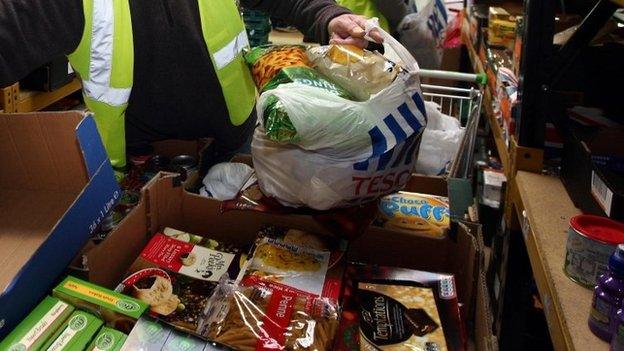Councils spending £3m on food poverty and food banks
- Published

The Trussell Trust said demand for its food banks has tripled since 2012
Almost £3m of public money is being used to help tackle food poverty, BBC Panorama has discovered.
A third of all councils in England and Wales said they had subsidised food banks.
The government said local authorities were now responsible, and better placed, for providing emergency help.
The Bishop of Manchester said the government needed to be "explicit whether food banks are to be part of the system".
The Right Reverend David Walker is one of 27 Anglican bishops who recently described food poverty as "a national crisis".
'Plaster over gaping wound'
Panorama asked all 375 councils in England and Wales if they were funding food banks and, if so, how much money was involved. Of the 323 councils that responded, 140 said they were providing funding - more than a third of all councils.
The news comes as the right-of-centre think tank, Policy Exchange, says about 68,000 benefit claimants are having their welfare payments stopped "unfairly" each year, which is increasing demand for food banks.
Panorama discovered that £2.9m of public money has been spent by councils over the last two years to help feed people.
Derbyshire County Council said healthy eating used to be its most pressing concern, but this had been overtaken by food poverty.
The council said it would be investing £126,000 from its public health budget into food banks this year.
"If people can't eat at all, what's the point in trying to get them to eat healthily?" said Julie Hirst, Public Health Specialist at Derbyshire County Council.
"I'm responsible for promoting the health of the people of Derbyshire, and if people haven't got enough food to eat, I've got to do something about it."
Professor Liz Dowler, a food policy expert and one of the authors of a recent government report about food banks, said there was a danger the lines between food banks and the state were becoming blurred.
"Food banks are an inadequate plaster over a gaping wound," she said. "They do not solve the problems. And that they should be enshrined as an inadequate solution is deeply immoral."
Part of the system?
"We need the government to be explicit whether food banks are to be part of the system and if they are, how do we make them work effectively," said Bishop Walker.
"If they are not part of the system then again we need a clear signal for the government about that."
The Department for Work and Pensions said food banks were not part of the benefits system.
"Local authorities are now responsible for providing short-term, emergency help to those who need it and additional funding has been devolved to help them do so."
The exact number of people using food banks is not known but the Trussell Trust, the biggest network of food banks in the country, said it helped feed hundreds of thousands of people last year. It said the number of people asking for free food has tripled since 2012.
The Trussell Trust and Citizens Advice say the main causes of the rise in demand are problems with benefits, low income and debt.
But the government has said that food banks themselves are helping to increase the demand by offering free food.
The Department for Work and Pensions said the government's welfare reforms will make 3m households better off.
"The benefits system supports millions of people who are on low incomes or unemployed and there is no robust evidence that welfare reforms are linked to the increased use of food banks."
Policy Exchange reported that a high number of people who break their job search search conditions for the first time get their benefits mistakenly taken away from them, and face undue financial hardship as a result.
Jobseekers can lose up to four weeks' worth of money if they do not adhere to certain regular benefit requirements, such as attending interviews.
The author of the think tank's report, Guy Miscampbell, said: "It is clear there are a significant number of people who have their benefit taken away from them unfairly. Four weeks without any money is driving people to desperate measures including a reliance on food banks."
"Issuing first time offenders, who may or may not have been fairly sanctioned, with a 'yellow card' in the form of a benefits card would be a more compassionate way of trying to help people back into work."
Panorama: Hungry Britain?, BBC One, Monday 3 March at 20:30 GMT and then available in the UK on the BBC iPlayer.
- Published21 February 2014
- Published21 February 2014
- Published10 February 2014
- Published30 May 2013